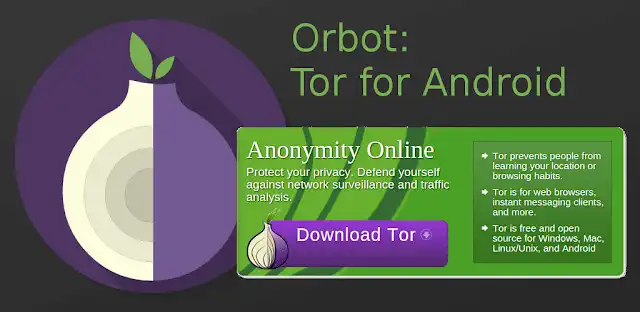Tor (The Onion Router) is an open-source software program that hides your activity and location online by routing all your browsing through multiple anonymous servers, thereby it prevents somebody watching your Internet connection from learning what sites you visit.
Tor prevents the sites you visit from learning your physical location, and it lets you access sites which are blocked. It protects against a common form of Internet surveillance known as traffic analysis. It consists of a huge proxy database that users can access to protect their network privacy and keep their online identity safe.
Using Tor’s software will make it difficult, if not impossible, for any snoops to see your webmail, search history, social media posts or other online activity. They also won’t be able to tell which country you’re in by analyzing your IP address, which can be very useful for journalists, activists, businesspeople and more.
Also Read:
- Best Android browsers for Right features and performance
- Most Secure Browsers for security & privacy
- What Is ARP Spoofing attack and How does it work
Who owns Tor?
It was originally developed for the U.S. Navy in an effort to protect government communications. The name of the software originated as an acronym for The Onion Router but it is now the official name of the program.
The U.S. Naval Research Laboratory sponsored the development of onion routing in the 1990s, and Tor itself was developed by Navy and independent researchers in 2002. It is written in C programming language with roughly 146,000 lines of source code.
Today, It’s original creators continue to support and update the protocol under the Tor Project, an independent, nonprofit organization that is partly funded by various arms of the U.S. government. Its protocol is open-source, that means anyone can view the code and incorporate it into their own software.
How Tor works
The name Tor originated as an acronym for The Onion Router and refers to the way in which data encryption is layered. When using Tor:
- Your internet connection is routed through at least 3 random “nodes” (volunteer-run servers)
- These nodes can be located anywhere in the world
- The data is re-encrypted multiple times (each time it passes through a node)
- Each node is only aware of the IP addresses “in front” of it, and the IP address of the node “behind” it
- This should mean that at no point can anyone know the whole path between your computer and the website you are trying to connect to (even if some nodes along the path nodes are controlled by malicious entities)
The real beauty of the Tor system is that you do not have to trust anyone. It is designed so that no-one can discover your true identity, and (if you connect to a secure website) no-one can access your data.
What can you do with Tor browser that you normally Do?
If you want to be anonymous. It is useful for anyone who wants to keep their internet activities out of the hands of advertisers, ISPs, and websites. That includes people getting around censorship restrictions in their country, police officers looking to hide their IP address or anyone else who doesn’t want their browsing habits linked to them.
Tor Browser blocks unwanted and vulnerable plugin and much more that tends to be dangerous for your privacy. This Project recommends using the commercial virtual-machine software Virtual Box or the open-source secure Linux distribution Tails to download and manage documents online and warns that BitTorrent and the Tor Browser do not work well together and should not be combined.
What Tor Doesn’t Do?
As an online anonymizer, It was designed to be secure. It is handy, but it’s far from perfect. Don’t think just because you’re using it that you’re perfectly anonymous.
However, documents leaked by former National Security Agency(NSA) can tell if you’re a Tor user and that makes them more likely to target you. Anonymity is not the same as security. It’s hard to hack into The Onion Router, but the browser is a different story.
But NSA can get into your browser a lot easier than it can the network and once it does, it gets access to everything else. So, “man in the middle” style attacks on Tor are still possible with the help of internet service providers.
How do I host a Tor relay?
Volunteering to host a Tor relay means donating some of your computer’s bandwidth to send and receive data on the Tor network. According to this Project, the only requirement is having Internet bandwidth of 50 kilobytes (not kilobits) per second about 10 percent of standard cable-modem bandwidth.
Each Tor relay is one of many possible nodes through which any given data packet can pass. So the more relays there are, the more relays each data packet can pass through and the more secure Tor is.
No data that passes through your relay is stored on your computer, and unless you’re the end relay — that is, the receiver of a data packet — you can’t know the precise nature of the data going through your server, and any surveillance or investigation won’t be able to trace the data packet’s path back to your computer.
Presently, no court has ever considered any case involving their technology, and we, therefore, cannot guarantee that you will never face any legal liability as a result of running a Tor relay,” states a FAQ on the Onion Project’s website written by the Electronic Frontier Foundation (EFF), a San Francisco-based digital-rights advocacy group. “However, the EFF believes so strongly that those running Tor relays shouldn’t be liable for traffic that passes through the relay that we’re running our own middle relay.”
Advantages Of Tor Browser
- Since it is a distributed network run by volunteers, it is extremely difficult for any government or organization to shut it down.
- The routing method does not reveal your IP address to the websites you visit.
- It’s free to use the software and network.
- It allows you to access geographically restricted websites and content.
Tor Browser is For Android Users
After desktop, now Tor Project has released the first ever Tor Browser for Android users. Tor gets its first official mobile browser for the Android app. Read more.
Orbot: Free proxy for Tor on Android

Orbot is the official Android app for the Onion Project, whose free Tor network of Internet servers around the world can anonymize and encrypt your activities on the Web, preventing your Internet service provider or other people from snooping on you.
It is designed to be used in conjunction with Tor. Orbot is a free proxy app that empowers other apps to use the internet more securely. Orbot uses it to encrypt your Internet traffic and then hides it by bouncing through a series of computers around the world.
Tor Browser is free software and an open network that helps you defend against a form of network surveillance that threatens personal freedom and privacy, confidential business activities and relationships, and state security known as traffic analysis.
Download Orbot from here::

Type: Android App Developer: The Tor Project
Get Tor Browser for Android from Google Play
Download Tor Browser From Here:: https://www.torproject.org/projects/torbrowser.html.en

Type: Web browser Developer: The Tor Project Operating system: Windows, Mac, Linux









